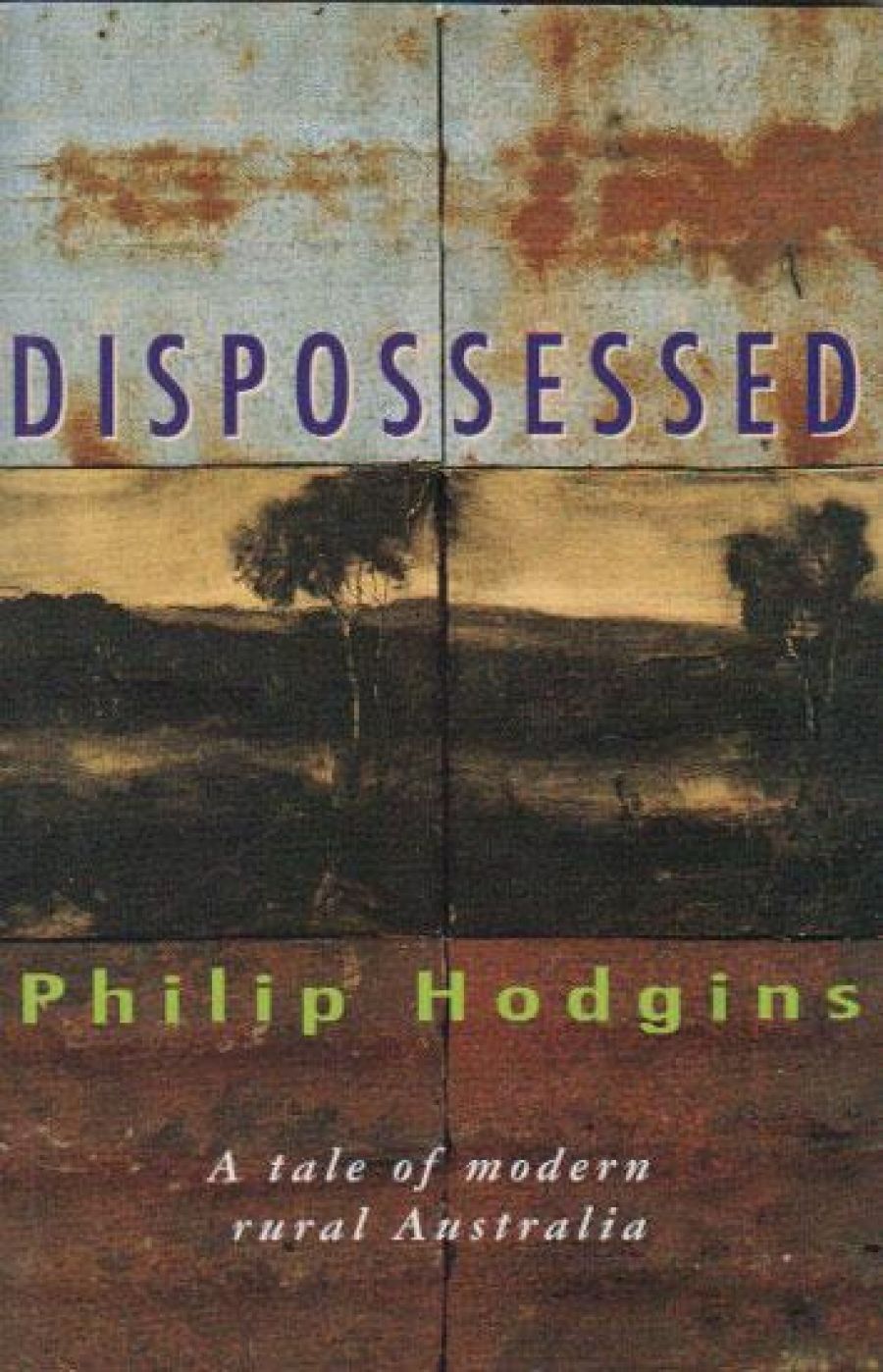
- Free Article: No
- Contents Category: Australian Poetry
- Review Article: Yes
- Online Only: No
- Custom Highlight Text:
With unsentimental compassion and irony, Dispossessed tackles the weighty topic of the rural crisis. In a sense the title of Phillip Hodgins’s verse novella gives too much away, casting a deliberate shadow over all that follows. Yet the manner in which Hodgins spins his yam is constantly engaging.
- Book 1 Title: Dispossessed
- Book 1 Biblio: A&R, $14.95pb
We have been saturated with stories of the farmer as an economic casualty. Acknowledging it as a terrible situation, perhaps we have become desensitised to the plight of individuals. This is the focus of Dispossessed. Hodgins portrays, in intricate detail, the downfall of a single family living on the land. There is something of Robert Frost here, but none of the romanticism.
His characters are active and credible, often ugly, with human failings; not yet the passive victims of newsreels. There is the wife and mother, Liz, pregnant again, a smoker; her husband, Len, who cannot face the approaching reality of losing their farm; Max, the stubborn and abrasive patriarch, at odds with his environment. Finally the young daughter, Amanda, who witnesses peripherally the collapse of their world.
There is incident aplenty. Hodgins deftly avoids the potential cliché of some situations with a precision of detail and a directness of style. The tone is intimate and personal. When Amanda and her father go shooting they bag a wallaby:
Amanda followed close behind, amused at how the head was nodding as it dragged across the contours of the ground.
There are many vivid observations of nature. The birth of a calf is described variously as like ‘a stew being stirred’ and ‘a sinking ship’.
There are fleas in the drinking water after rain:
like some
great flock of birds observed from far away.
It is this heightened significance of every detail that makes the story rise above the cliché of a pub yam.
The kettle boiled and blew its
whistle off
into the gap between the gas rings
where
the blackened griller was.
Presented as blank verse each line gives more weight to incident than prose otherwise might have. What holds the reader is Hodgins’ microscopic attention to detail. Yet sometimes the poetic economy of language is sacrificed for the sake of narrative. The picture is occasionally dense with extra detail; however, more often than not, the trimmed images convey a dramatic tension:
The sound of milk
syringing into Liz’s bucket stopped. And then resumed.
Hodgins is at his best when he keeps things simple. This poetic minutia helps build a gradual picture of implied loss.
The tragedy of Dispossessed is one of personalities, not economics. Hodgins waves no banners. He is astute enough to hint at the wider crisis via the conflict between the characters, particularly the subtle strain between Liz and Len. However there seems to be no real sense of urgency at the imminent foreclosure of the farm. Nor are they described as being particularly good or bad farmers. There is little explanation for why they may have failed, other than, ‘these feed-lots ... springing up’.
I’m not sure if this is fully satisfying. Rather, the characters are ordinary, sometimes selfish, people who tend to squabble, blaming each other for their predicament.
Neither does Hodgins give much indication as to what the characters find attractive about their lives on the land, which makes their dispossession all the more inevitable. The ending suggests surrender without a struggle. The final chapter is a poignant vision of old Max, that ‘harmless looking relic from the bush’, hunting a snake through the derelict rooms of his house. Alone and bitter at how life has treated him.
It is Liz who has the better appreciation of their lot, though at the end she is by no means resolved. Through her eyes Hodgins gives an insight into the accumulative effect of incident and detail. Liz’s observation of a flood shows that:
The thin skinned water pushing in the same
direction held a kind of narrative:
connected things were always happening
In his introduction Robert Gray describes Dispossessed as being ‘told in the laconic and brutally unillusioned style of a rural anecdote’.
It is this and more. Hodgins has told an important story, without judgement, or despair (though he comes close). If the prosaic rhythms of the language sometimes crowd the narrative, it is generally to good purpose. Beneath it all the poetry prevails.


Comments powered by CComment